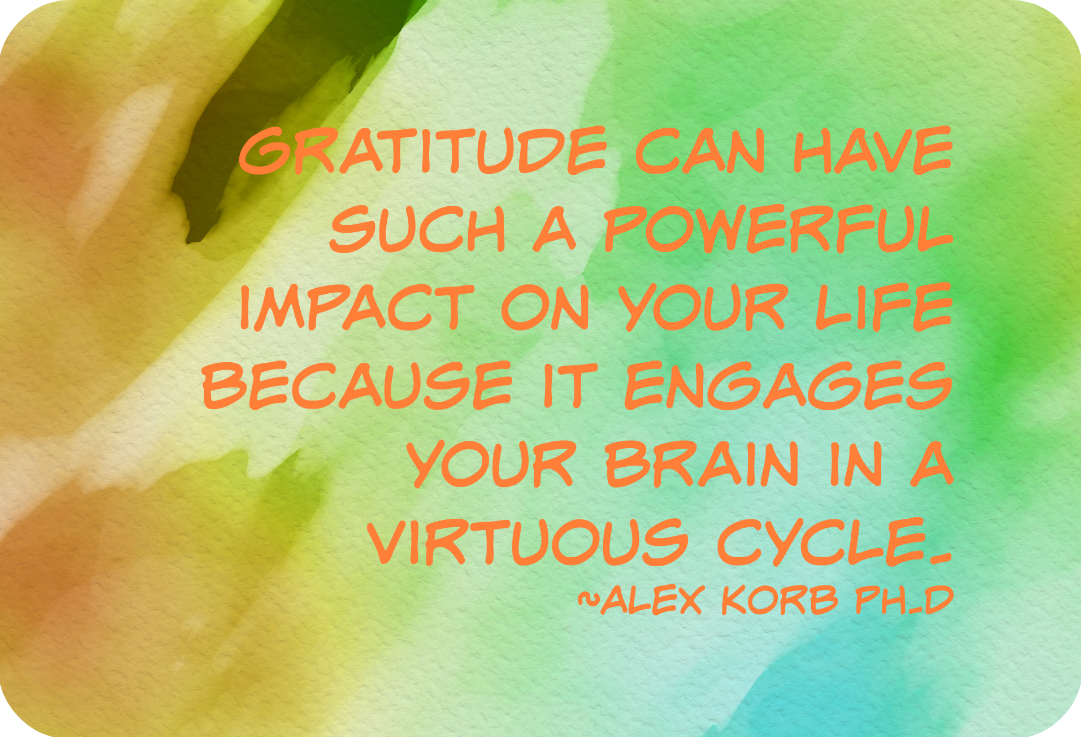Gratitude can have such a powerful impact on your life because it engages your brain in a virtuous cycle. ~Alex Korb Ph.D
By implementing gratitude into company culture, employees are more willing to spread their positive feelings with others, whether it’s helping out with a project or taking time to notice and recognizing those that have gone the extra mile.
The greatest psychological effect of appreciation is the happiness and other emotions immediately felt when we either give or receive gratitude. Gratitude creates good feelings, cheerful memories, better self-esteem, feeling more relaxed and more optimistic. All of these emotions creates a pay it forward and “we’re in this together” mentality in the workplace, which in turn, makes your organization more successful. Plus, the dopamine effect will encourage a continuous cycle of recognition if everyone participates. All of these emotions, plus many more, are what most employers want out of their staff to again, create unity.
To have a real impact on workplace positivity, workplace gratitude should be practiced at all levels. Leaders should show appreciation to their employees, employees should show gratitude to one another and to their bosses. And leaders and employees should show it to their customers.
“It’s obvious when you are in a workplace where people value gratitude and graciousness,” says Liz Jazwiec author of Eat That Cookie!: Make Workplace Positivity Pay Off … For Individuals, Teams and Organizations. “There is a really great vibe in those places. And when gratitude and graciousness are missing, it is equally evident. People in those environments seem to have a sense of entitlement. Co-workers who come into contact with them might say, ‘There is just no pleasing those people!’ Customers might say, ‘They just don’t care about me!’ Neither reaction is good for business.”
The great thing about infusing gratitude into the workplace is that it can come from anyone, regardless of position.
1. Say thank you
When someone does something kind for you, whether it’s your boss, your co-worker, or a stranger, recognize it! A simple “thanks” will do. “You can’t expect people to appreciate you if you don’t receive their kindnesses and compliments with thankfulness,” says Jazwiec. Being appreciated makes others happy. meet the gratitude your boss is showing with a little gratitude in return,” continues Jazwiec. “Otherwise he will start thinking that his recognition doesn’t really mean anything to anyone, and his exercise in gratitude will be short-lived.
2. Have an “It’s the thought that counts” attitude
Take into account the intentions of your boss or your co-workers. If it is clear that they meant for something to be a way of thanking you or helping you, don’t complain about how they missed the mark. Thank them for thinking of you and move on!”
3. Communicate openly and honestly
If it’s gratitude you need, tell someone! Sometimes leaders or co-workers are so caught up in their own tasks that they forget about those working around them. Our natural reaction when this happens is to either hold in negative feelings or complain to someone else. But a more proactive stance might be to opt for open and honest communication.
Ask your boss or co-workers if you are giving them everything they need. And you might also start showing them some appreciation. Gratitude is a two-way street. If you start making other people feel appreciated, nine times out of ten they will not be able to hold in their appreciation for you. You don’t have to wait for one of your leaders from on high to implement a gratitude initiative. It will be just as effective if it starts with you!
4. Be prepared for some kind wordsIf you are unaccustomed to getting compliments, it may take some time for you to feel comfortable receiving them. Rehearse being gracious and grateful. It seems strange that we should have to practice saying ‘thank you,’ but many of us just don’t know how to process gratitude.
“Leaders, this is an important practice for you,” says Jazwiec. “It isn’t easy for many employees to approach their bosses – even when it is with a compliment – so make sure you give them the attention they deserve. Truly listen to them. Take a second, no matter what you are doing, to engage with them. And afterwards shoot them a quick email or send them a note thanking them for their kind words.”
5. Thank those you serve
Once you have mastered giving and receiving gratitude with your bosses and co-workers, move on to the people you serve. You can do it with a simple, ‘Thank you for giving us your business.’ Or thank them by providing other special incentives or coupons. The how isn’t as important as making sure they know you are grateful that they are choosing to do business with you over your competition.
6. Gratitude encourages repeat performances
Remember the behavior we recognize will be repeated. If we take the time to say ‘thanks’, our entire workplace will improve. Everyone will like each other more and want to go the extra mile for one another. And customers will be happier when they feel the good vibes of a place where everyone is appreciated.
“I know from experience that the best places to work are places where teams are grateful for what is given to them and aren’t afraid to express sincere appreciation whenever it is merited,” says Jazwiec. “The best places to work are those where individuals, regardless of their position, accept compliments and praise with grace and don’t second-guess the intention.
Article excerpts from reliableplant.com and emergenetics.com.

 RSS Feed
RSS Feed